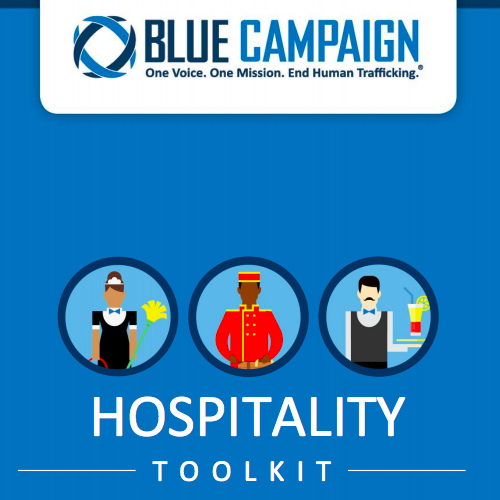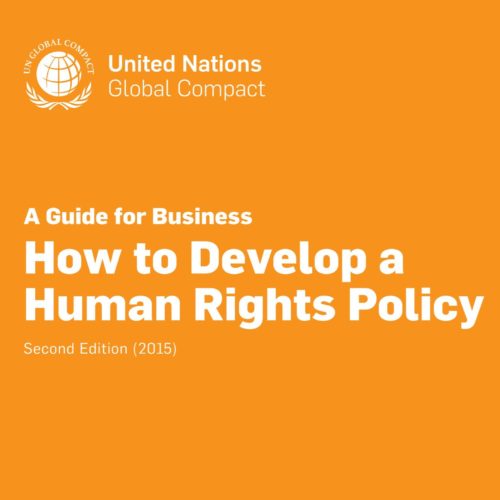-
 The GLAA (formerly GLA) is a non-departmental public body in the United Kingdom regulating the supply of workers to the agricultural, horticultural and shellfish industries, and any associated processing and packaging industries. It has been granted police-style powers to investigate labour abuse and exploitation across all aspects of the UK labour market. Specific public authorities now have a duty to notify the Secretary of State of any person in England and Wales suspected of being a victim of human trafficking. This 10 minute video is an excellent resource for demonstrating the methods traffickers use to entrap and exploit people through modern slavery. Credit: Gangmasters and Labour Abuse Authority
The GLAA (formerly GLA) is a non-departmental public body in the United Kingdom regulating the supply of workers to the agricultural, horticultural and shellfish industries, and any associated processing and packaging industries. It has been granted police-style powers to investigate labour abuse and exploitation across all aspects of the UK labour market. Specific public authorities now have a duty to notify the Secretary of State of any person in England and Wales suspected of being a victim of human trafficking. This 10 minute video is an excellent resource for demonstrating the methods traffickers use to entrap and exploit people through modern slavery. Credit: Gangmasters and Labour Abuse Authority -
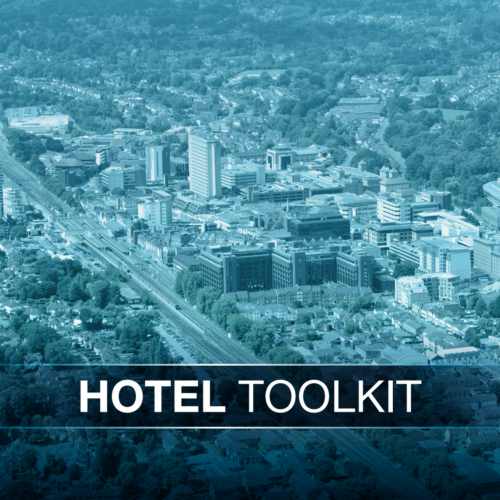 This toolkit was created by Surrey Police and is intended to provide staff working in the hotel industry with supporting information on how to act if they should encounter a human trafficking situation. The first section focuses on Operation Makesafe, which focuses on identifying victims of child sexual exploitation. The second section details action to take on encountering a potential victim.
This toolkit was created by Surrey Police and is intended to provide staff working in the hotel industry with supporting information on how to act if they should encounter a human trafficking situation. The first section focuses on Operation Makesafe, which focuses on identifying victims of child sexual exploitation. The second section details action to take on encountering a potential victim.Credit: Surrey Police
-
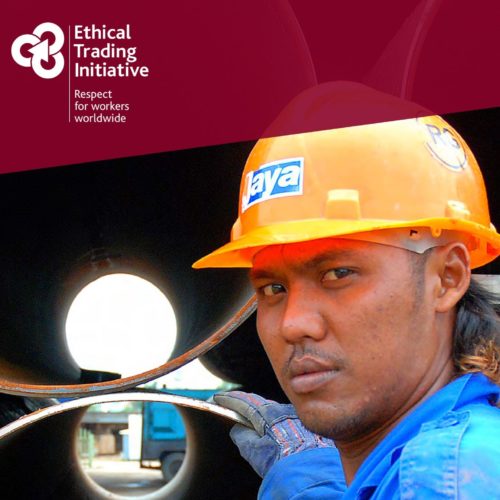 The Ethical Trading Initiative (ETI) is an alliance of companies, trade unions and NGOs that promotes workers' rights around the world. This guide is for companies to help them prevent and manage labour rights risks, and understand why engagement, negotiation and collaboration is key.
The Ethical Trading Initiative (ETI) is an alliance of companies, trade unions and NGOs that promotes workers' rights around the world. This guide is for companies to help them prevent and manage labour rights risks, and understand why engagement, negotiation and collaboration is key.Credit: Ethical Trading Initiative
-
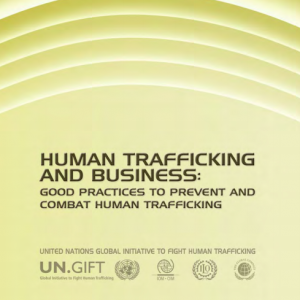 This report presents an introduction and overview of human trafficking and the role that business can play in addressing it. It draws from key case studies to illustrate some of the many ways employers can practically address human trafficking.
This report presents an introduction and overview of human trafficking and the role that business can play in addressing it. It draws from key case studies to illustrate some of the many ways employers can practically address human trafficking.Credit: UN Global Initiative to Fight Human Trafficking
-
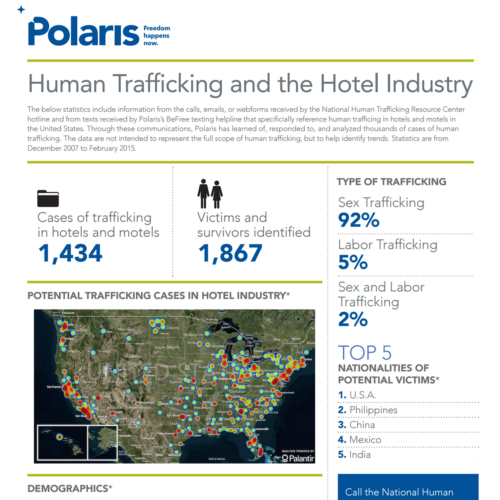 This infographic factsheet from Polaris has been put together using statistics from the National Human Trafficking Resource Centre hotline and texts from the Polaris BeFree texting helpline. It specifically references human trafficking in hotels and motels in the US. The data is used to identify trends in cases and indicators of sex and labour trafficking in hotels, and the factsheet provides recommendations for the hotel industry.
This infographic factsheet from Polaris has been put together using statistics from the National Human Trafficking Resource Centre hotline and texts from the Polaris BeFree texting helpline. It specifically references human trafficking in hotels and motels in the US. The data is used to identify trends in cases and indicators of sex and labour trafficking in hotels, and the factsheet provides recommendations for the hotel industry.Credit: Polaris Project
-
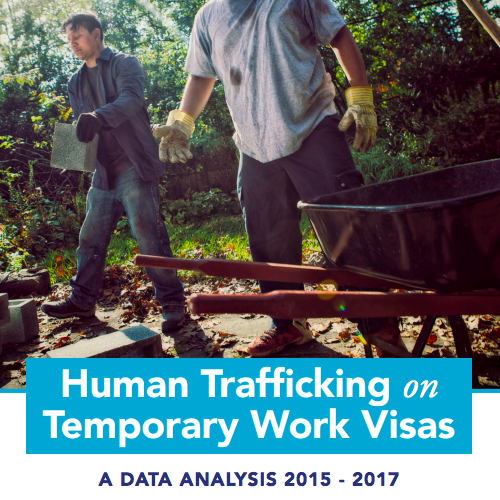 This report highlights the destructive practice of labour trafficking on temporary work visas, how the system is flawed, and the steps needed to fix it. From 2015-2017, Polaris collected data on the US temporary work visa system and identified some 800 victims of human trafficking who held temporary work visas at the time of their abuse.
This report highlights the destructive practice of labour trafficking on temporary work visas, how the system is flawed, and the steps needed to fix it. From 2015-2017, Polaris collected data on the US temporary work visa system and identified some 800 victims of human trafficking who held temporary work visas at the time of their abuse.Credit: Polaris
-
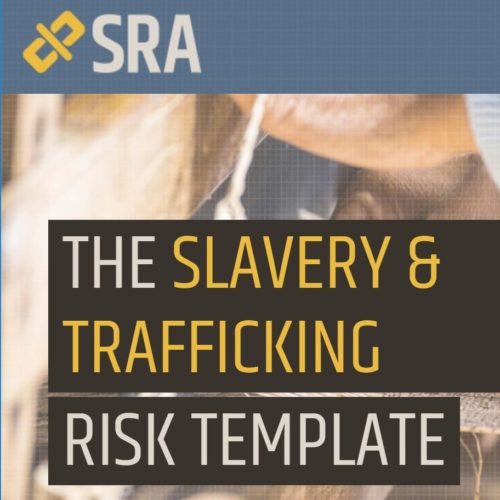 The Slavery and Human Trafficking Risk Template (STRT) is a free, open-source data collection template that forms the backbone of corporate modern slavery due diligence programs. It is maintained by a Development Committee committed to ensuring it keeps stride with new research and evolving industry needs. It is housed under the Social Responsibility Alliance, an initiative dedicated to providing companies with the open-source data collection tools they need to build socially responsible supply chains.
The Slavery and Human Trafficking Risk Template (STRT) is a free, open-source data collection template that forms the backbone of corporate modern slavery due diligence programs. It is maintained by a Development Committee committed to ensuring it keeps stride with new research and evolving industry needs. It is housed under the Social Responsibility Alliance, an initiative dedicated to providing companies with the open-source data collection tools they need to build socially responsible supply chains.Credit: Social Responsibility Alliance
-
 The ITP engages with the world's leading hotel companies to drive responsible business in the hotel industry. They offer best practice, practical tools and programmes to facilitate collaboration. This guide was developed to help hoteliers understand human trafficking, the risk of the issue affecting them and their business, and what they can do to combat the problem.
The ITP engages with the world's leading hotel companies to drive responsible business in the hotel industry. They offer best practice, practical tools and programmes to facilitate collaboration. This guide was developed to help hoteliers understand human trafficking, the risk of the issue affecting them and their business, and what they can do to combat the problem.Credit: International Tourism Partnership (ITP)
-
 Stronger Together is a multi-stakeholder initiative which aims to reduce modern slavery. It provides guidance, training and resources to organisations, employers, labour providers, workers and their representatives. This free collection of resources includes pragmatic guidance and toolkits, and resources for the workplace including multilingual posters, leaflets and template policies. This guidance is intended for tenants renting home privately in the UK. It includes both obligations of the landlord and of tenants, and provides contact and advice helplines.
Stronger Together is a multi-stakeholder initiative which aims to reduce modern slavery. It provides guidance, training and resources to organisations, employers, labour providers, workers and their representatives. This free collection of resources includes pragmatic guidance and toolkits, and resources for the workplace including multilingual posters, leaflets and template policies. This guidance is intended for tenants renting home privately in the UK. It includes both obligations of the landlord and of tenants, and provides contact and advice helplines.Credit: Stronger Together
-
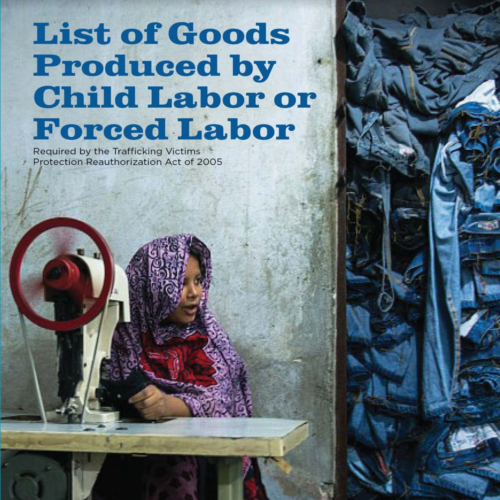 The US Department of Labor maintains a list of goods and their source countries which it believes likely to have been produced by child labour or forced labour in violation of international standards. It is not an exhaustive list and is primarily intended to raise public awareness, but is a useful starting point for considering the origins of any products bought for use by and within the hotel.
The US Department of Labor maintains a list of goods and their source countries which it believes likely to have been produced by child labour or forced labour in violation of international standards. It is not an exhaustive list and is primarily intended to raise public awareness, but is a useful starting point for considering the origins of any products bought for use by and within the hotel.Credit: US Government
-
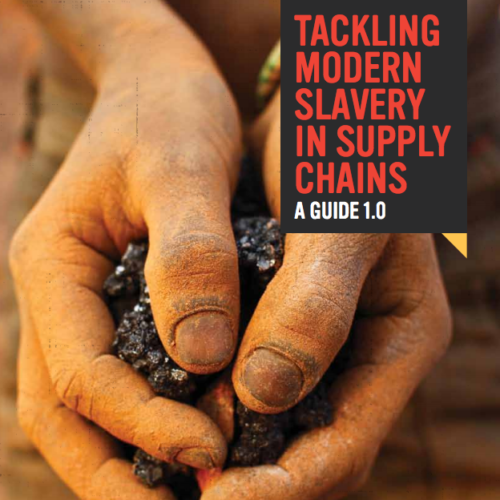 The Walk Free Foundation was established by Andrew Forrest, the Chairman of Fortescue Metals Group, after he found labour exploitation within his own supply chains and took a number of steps to prevent modern slavery affecting his business. This comprehensive guide considers corporate policy on modern slavery and provides both guidance and tools to implement it. It includes advice on corporate policy and provides template examples of a number of tools.
The Walk Free Foundation was established by Andrew Forrest, the Chairman of Fortescue Metals Group, after he found labour exploitation within his own supply chains and took a number of steps to prevent modern slavery affecting his business. This comprehensive guide considers corporate policy on modern slavery and provides both guidance and tools to implement it. It includes advice on corporate policy and provides template examples of a number of tools.Credit: Walk Free Foundation & Verite
-
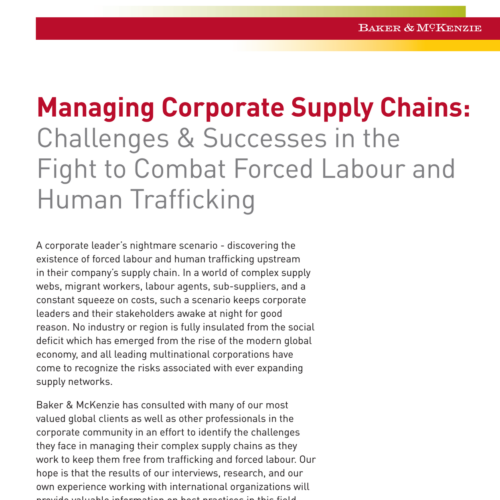 This guide is published by a law firm with expertise providing modern slavery related advice to business. It gives a good overview of the scope of the problem of trafficking in supply chains, and what existing support there is for business. It looks at the legal mechanisms already in place to protect against modern slavery in corporate supply chains, as well as the successes and challenges of corporate initiatives, and solutions to the problem.
This guide is published by a law firm with expertise providing modern slavery related advice to business. It gives a good overview of the scope of the problem of trafficking in supply chains, and what existing support there is for business. It looks at the legal mechanisms already in place to protect against modern slavery in corporate supply chains, as well as the successes and challenges of corporate initiatives, and solutions to the problem.Credit: Baker McKenzie
-
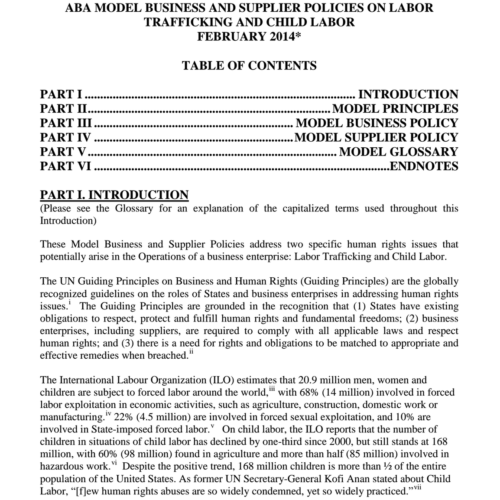 These model principles are intended for both businesses and suppliers that do not currently have policies relating to labour trafficking and child labour, and for those that do but want to adapt them to reflect evolving practices. Included are examples of model policies and principles that can be incoporated into codes of conduct or current business policies.
These model principles are intended for both businesses and suppliers that do not currently have policies relating to labour trafficking and child labour, and for those that do but want to adapt them to reflect evolving practices. Included are examples of model policies and principles that can be incoporated into codes of conduct or current business policies.Credit: American Bar Association
-
 Stronger Together is a multi-stakeholder initiative which aims to reduce modern slavery. It provides guidance, training and resources to organisations, employers, labour providers, workers and their representatives. This free collection of resources includes pragmatic guidance and toolkits, and resources for the workplace including multilingual posters, leaflets and template policies. These seven principles have been agreed upon by the supermarket businesses sponsored by Stronger Together. The list includes "common principles" for the businesses' supply chains partners to follow when completing modern slavery statements.
Stronger Together is a multi-stakeholder initiative which aims to reduce modern slavery. It provides guidance, training and resources to organisations, employers, labour providers, workers and their representatives. This free collection of resources includes pragmatic guidance and toolkits, and resources for the workplace including multilingual posters, leaflets and template policies. These seven principles have been agreed upon by the supermarket businesses sponsored by Stronger Together. The list includes "common principles" for the businesses' supply chains partners to follow when completing modern slavery statements.Credit: Stronger Together
-
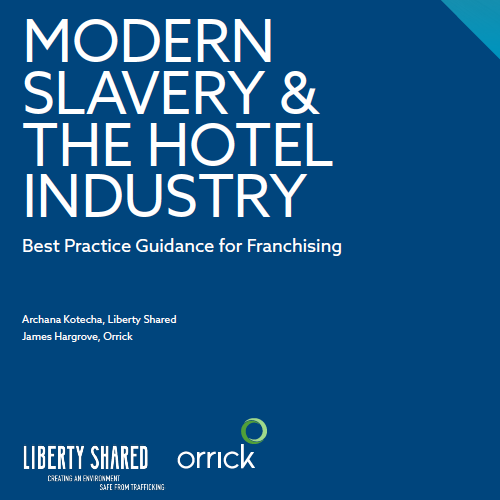 This guide, drafted by Liberty Shared, recognises the risks the hotel industry, and in particular hotels operating under major international brand franchises, face in regards to human rights abuses. This guide provides franchisors with an overview of the risks associated with modern slavery in relation to hotel franchise agreements and sets out practical solutions aimed at increasing the prospect that a franchisee's operations are free from these risks. Liberty Shared aims to prevent human trafficking through legal advocacy, technological interventions, and strategic collaborations with NGOs and corporations in Asia and globally.
This guide, drafted by Liberty Shared, recognises the risks the hotel industry, and in particular hotels operating under major international brand franchises, face in regards to human rights abuses. This guide provides franchisors with an overview of the risks associated with modern slavery in relation to hotel franchise agreements and sets out practical solutions aimed at increasing the prospect that a franchisee's operations are free from these risks. Liberty Shared aims to prevent human trafficking through legal advocacy, technological interventions, and strategic collaborations with NGOs and corporations in Asia and globally.Credit: Liberty Shared
-
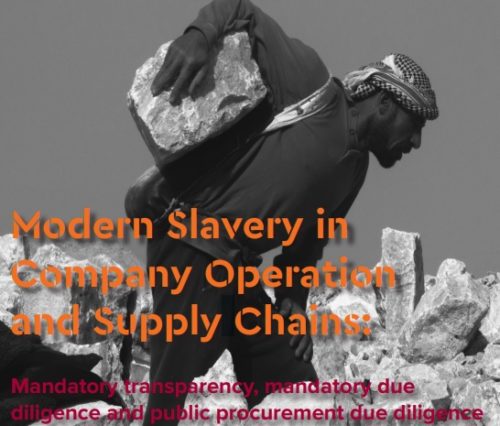 This paper sets out what leading governments are already doing to insist global business does more to eradicate modern slavery. It draws from this experience to set out how these uncoordinated actions could become a robust, and harmonised international standard for national legislation.
This paper sets out what leading governments are already doing to insist global business does more to eradicate modern slavery. It draws from this experience to set out how these uncoordinated actions could become a robust, and harmonised international standard for national legislation.Credit: ITUC and Business and Human Rights Resource Centre
-
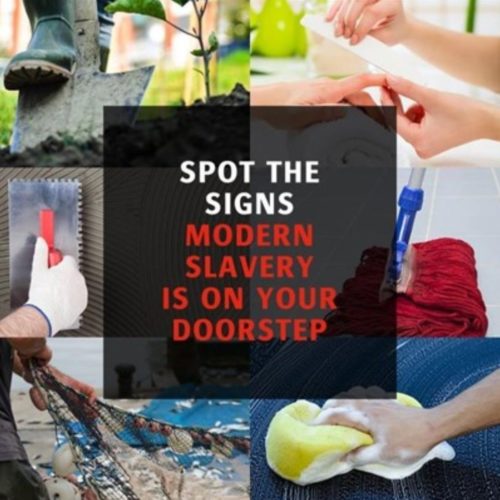 Crimestoppers is an independent charity helping law enforcement to locate criminals and help solve crimes. They have an anonymous 24/7 phone number (0800 555 111) that people can call to pass on information about crime. They are running a campaign to help people identify the signs of modern slavery and give specific information about the hospitality sector. The flyer about spotting the signs is in six languages.
Crimestoppers is an independent charity helping law enforcement to locate criminals and help solve crimes. They have an anonymous 24/7 phone number (0800 555 111) that people can call to pass on information about crime. They are running a campaign to help people identify the signs of modern slavery and give specific information about the hospitality sector. The flyer about spotting the signs is in six languages.Credit: Crimestoppers
-
 This is an analysis of modern slavery statements that focuses on changes in reporting and practice in addressing forced labour and human trafficking. It covers 150 sample companies across different sectors. It seeks to understand the quality and scope of reporting against the UK Modern Slavery Act’s transparency requirements set out in s. 54 as well as the accompanying guidance on recommended content published by the Home Office.
This is an analysis of modern slavery statements that focuses on changes in reporting and practice in addressing forced labour and human trafficking. It covers 150 sample companies across different sectors. It seeks to understand the quality and scope of reporting against the UK Modern Slavery Act’s transparency requirements set out in s. 54 as well as the accompanying guidance on recommended content published by the Home Office.Credit: Ergon Associates
-
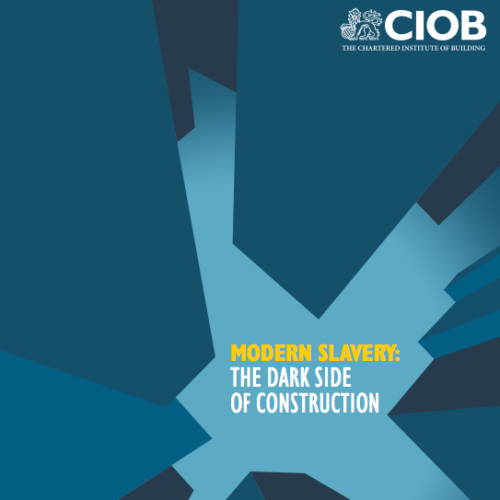 The Chartered Institute of Building published this report to shed light on exploitation within the construction industry. The report looks at labour exploitation all over the world considering the different types of exploitation in the industry, and offering recommendations to develop effective frameworks that will help protect human rights in the industry.
The Chartered Institute of Building published this report to shed light on exploitation within the construction industry. The report looks at labour exploitation all over the world considering the different types of exploitation in the industry, and offering recommendations to develop effective frameworks that will help protect human rights in the industry.Credit: Chartered Institute of Building (CIOB)
-
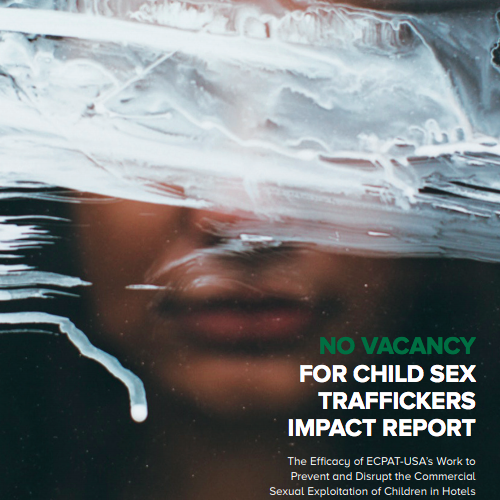 The report, "No Vacancy for Child Sex Traffickers Report: The Efficacy of ECPAT-USA’s Work to Prevent and Disrupt the Commercial Sexual Exploitation of Children in Hotels", highlights the efforts of ECPAT-USA in engaging the US travel and tourism industry in protecting children from sex trafficking and exploitation.
The report, "No Vacancy for Child Sex Traffickers Report: The Efficacy of ECPAT-USA’s Work to Prevent and Disrupt the Commercial Sexual Exploitation of Children in Hotels", highlights the efforts of ECPAT-USA in engaging the US travel and tourism industry in protecting children from sex trafficking and exploitation.Credit: ECPAT-USA
-
 Stronger Together is a multi-stakeholder initiative which aims to reduce modern slavery. It provides guidance, training and resources to organisations, employers, labour providers, workers and their representatives. This free collection of resources includes pragmatic guidance and toolkits, and resources for the workplace including multilingual posters, leaflets and template policies. This template is to be modified as required and for inclusion with a wider Tackling Modern Slavery in Business and Supply Chain or Business Human Rights Policy.
Stronger Together is a multi-stakeholder initiative which aims to reduce modern slavery. It provides guidance, training and resources to organisations, employers, labour providers, workers and their representatives. This free collection of resources includes pragmatic guidance and toolkits, and resources for the workplace including multilingual posters, leaflets and template policies. This template is to be modified as required and for inclusion with a wider Tackling Modern Slavery in Business and Supply Chain or Business Human Rights Policy.Credit: Stronger Together
-
 Stronger Together is a multi-stakeholder initiative which aims to reduce modern slavery. It provides guidance, training and resources to organisations, employers, labour providers, workers and their representatives. This free collection of resources includes pragmatic guidance and toolkits, and resources for the workplace including multilingual posters, leaflets and template policies. This template is to be modified as required and for inclusion with a wider Tackling Modern Slavery in Business and Supply Chain or Business Human Rights Policy.
Stronger Together is a multi-stakeholder initiative which aims to reduce modern slavery. It provides guidance, training and resources to organisations, employers, labour providers, workers and their representatives. This free collection of resources includes pragmatic guidance and toolkits, and resources for the workplace including multilingual posters, leaflets and template policies. This template is to be modified as required and for inclusion with a wider Tackling Modern Slavery in Business and Supply Chain or Business Human Rights Policy.Credit: Stronger Together
-
 Stronger Together is a multi-stakeholder initiative which aims to reduce modern slavery. It provides guidance, training and resources to organisations, employers, labour providers, workers and their representatives. This free collection of resources includes pragmatic guidance and toolkits, and resources for the workplace including multilingual posters, leaflets and template policies. This template is to be modified as required and for inclusion with a wider Tackling Modern Slavery in Business and Supply Chain or Business Human Rights Policy.
Stronger Together is a multi-stakeholder initiative which aims to reduce modern slavery. It provides guidance, training and resources to organisations, employers, labour providers, workers and their representatives. This free collection of resources includes pragmatic guidance and toolkits, and resources for the workplace including multilingual posters, leaflets and template policies. This template is to be modified as required and for inclusion with a wider Tackling Modern Slavery in Business and Supply Chain or Business Human Rights Policy.Credit: Stronger Together
-
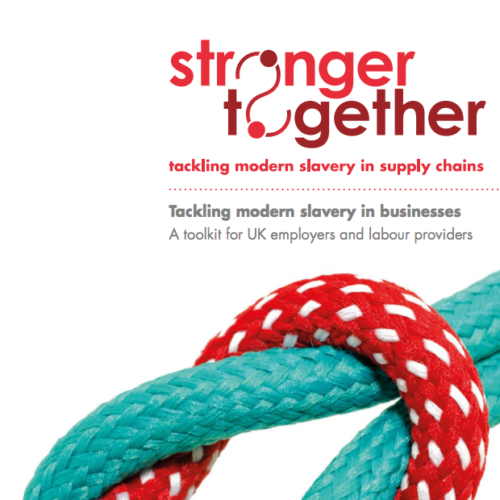 Stronger Together is a multi-stakeholder initiative which aims to reduce modern slavery. It provides guidance, training and resources to organisations, employers, labour providers, workers and their representatives. This free collection of resources includes pragmatic guidance and toolkits, and resources for the workplace including multilingual posters, leaflets and template policies. This template is to be modified as required and for inclusion with a wider Tackling Modern Slavery in Business and Supply Chain or Business Human Rights Policy.
Stronger Together is a multi-stakeholder initiative which aims to reduce modern slavery. It provides guidance, training and resources to organisations, employers, labour providers, workers and their representatives. This free collection of resources includes pragmatic guidance and toolkits, and resources for the workplace including multilingual posters, leaflets and template policies. This template is to be modified as required and for inclusion with a wider Tackling Modern Slavery in Business and Supply Chain or Business Human Rights Policy.Credit: Stronger Together
-
 Stronger Together is a multi-stakeholder initiative which aims to reduce modern slavery. It provides guidance, training and resources to organisations, employers, labour providers, workers and their representatives. This free collection of resources includes pragmatic guidance and toolkits, and resources for the workplace including multilingual posters, leaflets and template policies. This template is to be modified as required and for inclusion with a wider Tackling Modern Slavery in Business and Supply Chain or Business Human Rights Policy.
Stronger Together is a multi-stakeholder initiative which aims to reduce modern slavery. It provides guidance, training and resources to organisations, employers, labour providers, workers and their representatives. This free collection of resources includes pragmatic guidance and toolkits, and resources for the workplace including multilingual posters, leaflets and template policies. This template is to be modified as required and for inclusion with a wider Tackling Modern Slavery in Business and Supply Chain or Business Human Rights Policy.Credit: Stronger Together
-
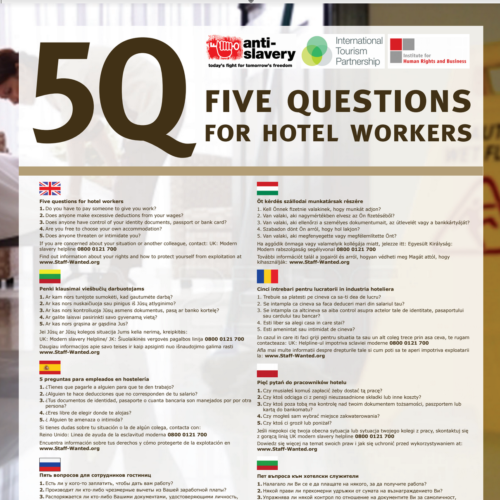 The Staff Wanted Initiative is a collaborative effort from Anti-Slavery International, the UK's only charity dedicated solely to ending modern slavery, and the IHRB, a leading international think tank on business and human rights. The Initiative works to expose and end exploitation of workers in UK hotels. This poster is part of their awareness-raising initiative within the hotel.
The Staff Wanted Initiative is a collaborative effort from Anti-Slavery International, the UK's only charity dedicated solely to ending modern slavery, and the IHRB, a leading international think tank on business and human rights. The Initiative works to expose and end exploitation of workers in UK hotels. This poster is part of their awareness-raising initiative within the hotel.Credit: Staff Wanted Initiative
-
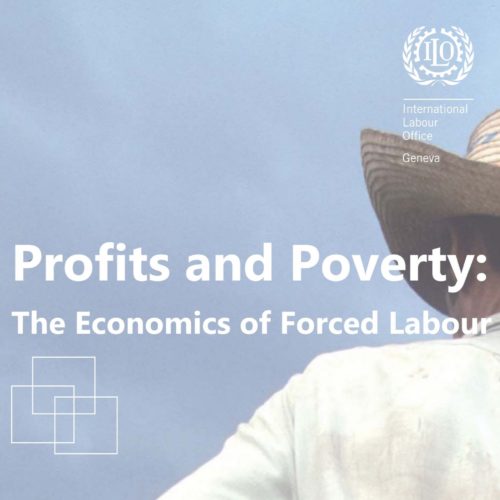 The purpose of this ILO report is to give a better understanding of the socio-economic root causes as well as a new assessment of the profits of forced labour. It highlights how forced labour thrives in the incubator of poverty and vulnerability, low levels of education and literacy, migration and other factors. The evidence and results presented in this report illustrate the need for stronger measures of prevention and protection and for enhanced law enforcement as the basic responses to forced labour. At the same time, it also provides new knowledge of the determinants of forced labour that can help with developing and expanding policies and programmes to not only stop forced labour where it exists, but prevent it before it occurs.
The purpose of this ILO report is to give a better understanding of the socio-economic root causes as well as a new assessment of the profits of forced labour. It highlights how forced labour thrives in the incubator of poverty and vulnerability, low levels of education and literacy, migration and other factors. The evidence and results presented in this report illustrate the need for stronger measures of prevention and protection and for enhanced law enforcement as the basic responses to forced labour. At the same time, it also provides new knowledge of the determinants of forced labour that can help with developing and expanding policies and programmes to not only stop forced labour where it exists, but prevent it before it occurs.Credit: International Labour Office (ILO) Special Action Programme to Combat Forced Labour (SAP-FL) Fundamental Principles and Rights at Work Branch (FPRW)
-
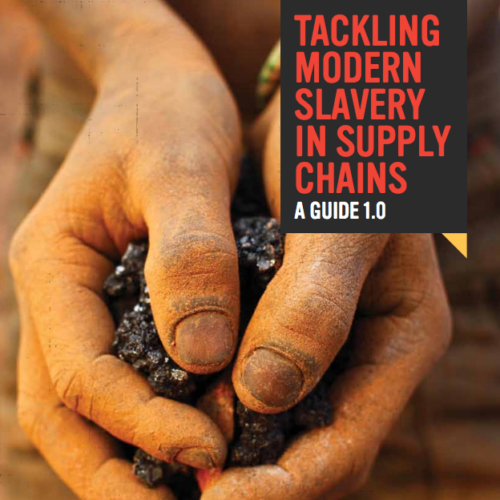 The Walk Free Foundation was established by Andrew Forrest, the Chairman of Fortescue Metals Group, after he found labour exploitation within his own supply chains and took a number of steps to prevent modern slavery affecting his business. This comprehensive guide considers corporate policy on modern slavery and provides both guidance and tools to implement it. It includes advice on corporate policy and provides template examples of a number of tools.
The Walk Free Foundation was established by Andrew Forrest, the Chairman of Fortescue Metals Group, after he found labour exploitation within his own supply chains and took a number of steps to prevent modern slavery affecting his business. This comprehensive guide considers corporate policy on modern slavery and provides both guidance and tools to implement it. It includes advice on corporate policy and provides template examples of a number of tools.Credit: Walk Free Foundation & Verite
-
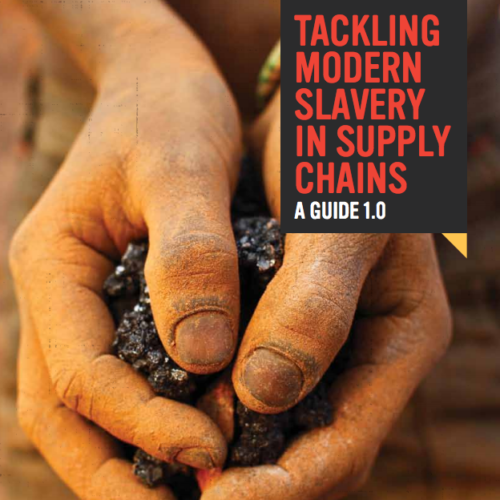 The Walk Free Foundation was established by Andrew Forrest, the Chairman of Fortescue Metals Group, after he found labour exploitation within his own supply chains and took a number of steps to prevent modern slavery affecting his business. This comprehensive guide considers corporate policy on modern slavery and provides both guidance and tools to implement it. It includes advice on corporate policy and provides template examples of a number of tools.
The Walk Free Foundation was established by Andrew Forrest, the Chairman of Fortescue Metals Group, after he found labour exploitation within his own supply chains and took a number of steps to prevent modern slavery affecting his business. This comprehensive guide considers corporate policy on modern slavery and provides both guidance and tools to implement it. It includes advice on corporate policy and provides template examples of a number of tools.Credit: Walk Free & Verite
-
 Stronger Together is a multi-stakeholder initiative which aims to reduce modern slavery. It provides guidance, training and resources to organisations, employers, labour providers, workers and their representatives. This free collection of resources includes pragmatic guidance and toolkits, and resources for the workplace including multilingual posters, leaflets and template policies. This template is to be modified as required and for inclusion with a wider Tackling Modern Slavery in Business and Supply Chain or Business Human Rights Policy.
Stronger Together is a multi-stakeholder initiative which aims to reduce modern slavery. It provides guidance, training and resources to organisations, employers, labour providers, workers and their representatives. This free collection of resources includes pragmatic guidance and toolkits, and resources for the workplace including multilingual posters, leaflets and template policies. This template is to be modified as required and for inclusion with a wider Tackling Modern Slavery in Business and Supply Chain or Business Human Rights Policy.Credit: Stronger Together
-
 Stronger Together is a multi-stakeholder initiative which aims to reduce modern slavery. It provides guidance, training and resources to organisations, employers, labour providers, workers and their representatives. This free collection of resources includes pragmatic guidance and toolkits, and resources for the workplace including multilingual posters, leaflets and template policies. This template is to be modified as required and for inclusion with a wider Tackling Modern Slavery in Business and Supply Chain or Business Human Rights Policy.
Stronger Together is a multi-stakeholder initiative which aims to reduce modern slavery. It provides guidance, training and resources to organisations, employers, labour providers, workers and their representatives. This free collection of resources includes pragmatic guidance and toolkits, and resources for the workplace including multilingual posters, leaflets and template policies. This template is to be modified as required and for inclusion with a wider Tackling Modern Slavery in Business and Supply Chain or Business Human Rights Policy.Credit: Stronger Together
-
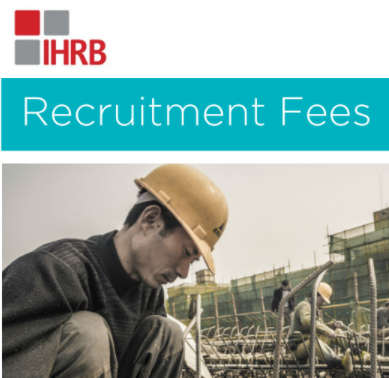 This is a briefing produced by the think tank IHRB on tackling the exploitative recruiter practice of charging recruitment fees. It outlines the harms of recruitment fees for workers and highlights how businesses can support migrant workers through legal compliance and transparency.
This is a briefing produced by the think tank IHRB on tackling the exploitative recruiter practice of charging recruitment fees. It outlines the harms of recruitment fees for workers and highlights how businesses can support migrant workers through legal compliance and transparency.Credit: Institute for Human Rights and Business (IHRB)
-
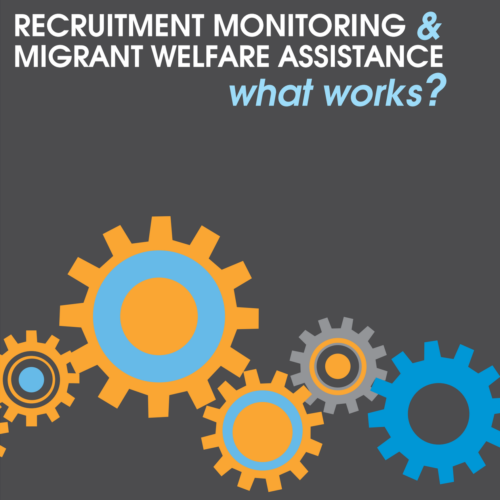 The IOM is a UN organisation providing advice and services to governments and migrants. This report focuses on the migrant welfare assistance currently offered to members of the Colombo Process group in countries of destination. It reviews provisions currently in place to prevent abusive recruitment practices and includes a proposed framework for measuring the effectiveness of recruitment monitoring.
The IOM is a UN organisation providing advice and services to governments and migrants. This report focuses on the migrant welfare assistance currently offered to members of the Colombo Process group in countries of destination. It reviews provisions currently in place to prevent abusive recruitment practices and includes a proposed framework for measuring the effectiveness of recruitment monitoring.Credit: International Organisation for Migration (IOM)
-
 The ILO is a UN organisation responsible for setting and monitoring international labour standards. This ILO paper includes an introduction and background to the context of labour recruitment in a period of increased global mobility, and details existing international and national labour standards to regulate recruitment of workers. It includes examples from the UK.
The ILO is a UN organisation responsible for setting and monitoring international labour standards. This ILO paper includes an introduction and background to the context of labour recruitment in a period of increased global mobility, and details existing international and national labour standards to regulate recruitment of workers. It includes examples from the UK.Credit: International Labour Organisation (ILO)
-
 Stronger Together is a multi-stakeholder initiative which aims to reduce modern slavery. It provides guidance, training and resources to organisations, employers, labour providers, workers and their representatives. This free collection of resources includes pragmatic guidance and toolkits, and resources for the workplace including multilingual posters, leaflets and template policies. This template is to be modified as required and for inclusion with a wider Tackling Modern Slavery in Business and Supply Chain or Business Human Rights Policy.
Stronger Together is a multi-stakeholder initiative which aims to reduce modern slavery. It provides guidance, training and resources to organisations, employers, labour providers, workers and their representatives. This free collection of resources includes pragmatic guidance and toolkits, and resources for the workplace including multilingual posters, leaflets and template policies. This template is to be modified as required and for inclusion with a wider Tackling Modern Slavery in Business and Supply Chain or Business Human Rights Policy.Credit: Stronger Together
-
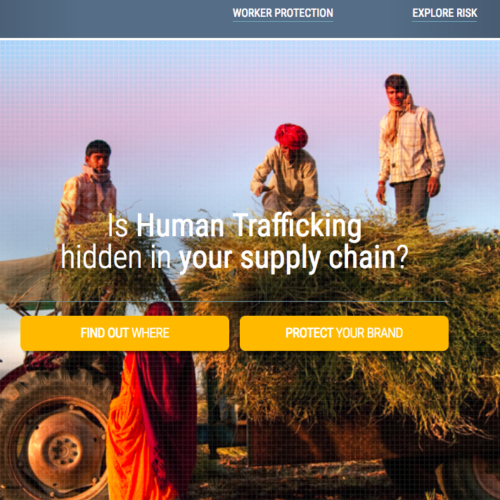 The website provides information about key demographic, economic, labor force, and socio-political conditions. In addition to a narrative report on the country’s trafficking situation, the graphics present information on factors like corruption, poverty, unemployment, migration rates, civil liberties, union rights, etc. that provide important (though not absolutely determinative) insights into the conditions and structures of a society that are associated with risk of trafficking, as well as other forms of labor exploitation.
The website provides information about key demographic, economic, labor force, and socio-political conditions. In addition to a narrative report on the country’s trafficking situation, the graphics present information on factors like corruption, poverty, unemployment, migration rates, civil liberties, union rights, etc. that provide important (though not absolutely determinative) insights into the conditions and structures of a society that are associated with risk of trafficking, as well as other forms of labor exploitation.Credit: The State Department’s Office to Monitor and Combat Trafficking in Persons, Verité, Made in a Free World & the Aspen Institute
-
 Stronger Together is a multi-stakeholder initiative which aims to reduce modern slavery. It provides guidance, training and resources to organisations, employers, labour providers, workers and their representatives. This free collection of resources includes pragmatic guidance and toolkits, and resources for the workplace including multilingual posters, leaflets and template policies. This template is to be modified as required and for inclusion with a wider Tackling Modern Slavery in Business and Supply Chain or Business Human Rights Policy.
Stronger Together is a multi-stakeholder initiative which aims to reduce modern slavery. It provides guidance, training and resources to organisations, employers, labour providers, workers and their representatives. This free collection of resources includes pragmatic guidance and toolkits, and resources for the workplace including multilingual posters, leaflets and template policies. This template is to be modified as required and for inclusion with a wider Tackling Modern Slavery in Business and Supply Chain or Business Human Rights Policy.Credit: Stronger Together
-
 The Walkfree Foundation was established by Andrew Forrest, the Chairman of Fortescue Metals Group, after he found labour exploitation within his own supply chains and took a number of steps to prevent modern slavery affecting his business. This comprehensive guide considers corporate policy on modern slavery and provides both guidance and tools to implement it. It includes advice on corporate policy and provides template examples of a number of tools. Credit: Walkfree Foundation & Verite
The Walkfree Foundation was established by Andrew Forrest, the Chairman of Fortescue Metals Group, after he found labour exploitation within his own supply chains and took a number of steps to prevent modern slavery affecting his business. This comprehensive guide considers corporate policy on modern slavery and provides both guidance and tools to implement it. It includes advice on corporate policy and provides template examples of a number of tools. Credit: Walkfree Foundation & Verite -
 Stronger Together is a multi-stakeholder initiative which aims to reduce modern slavery. It provides guidance, training and resources to organisations, employers, labour providers, workers and their representatives. This free collection of resources includes pragmatic guidance and toolkits, and resources for the workplace including multilingual posters, leaflets and template policies. This template is to be modified as required and for inclusion with a wider Tackling Modern Slavery in Business and Supply Chain or Business Human Rights Policy.
Stronger Together is a multi-stakeholder initiative which aims to reduce modern slavery. It provides guidance, training and resources to organisations, employers, labour providers, workers and their representatives. This free collection of resources includes pragmatic guidance and toolkits, and resources for the workplace including multilingual posters, leaflets and template policies. This template is to be modified as required and for inclusion with a wider Tackling Modern Slavery in Business and Supply Chain or Business Human Rights Policy.Credit: Stronger Together
-
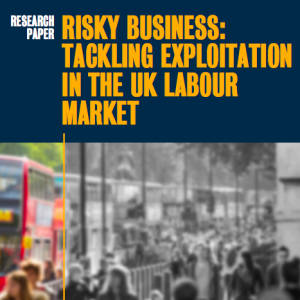 This report provides a comprehensive guide to an effective response to human trafficking for labour exploitation in the UK. It identifies the picture of risk to individuals of exploitation in the UK labour market, then presents solutions to such exploitation through: labour inspection and enforcement; gateways to advice and remedy; and corporate accountability.
This report provides a comprehensive guide to an effective response to human trafficking for labour exploitation in the UK. It identifies the picture of risk to individuals of exploitation in the UK labour market, then presents solutions to such exploitation through: labour inspection and enforcement; gateways to advice and remedy; and corporate accountability.Credit: Focus on Labour Exploitation (FLEX)
-
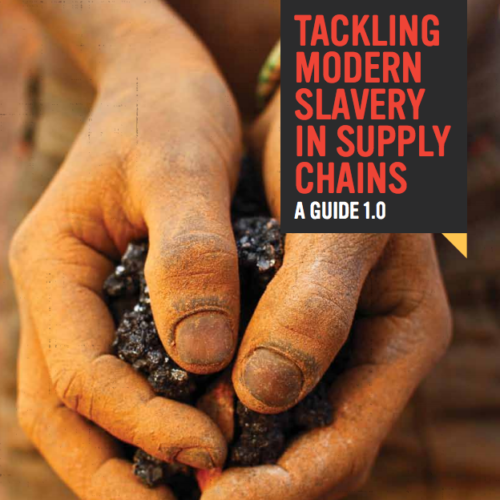 The Walk Free Foundation was established by Andrew Forrest, the Chairman of Fortescue Metals Group, after he found labour exploitation within his own supply chains and took a number of steps to prevent modern slavery affecting his business. This comprehensive guide considers corporate policy on modern slavery and provides both guidance and tools to implement it. It includes advice on corporate policy and provides template examples of a number of tools.
The Walk Free Foundation was established by Andrew Forrest, the Chairman of Fortescue Metals Group, after he found labour exploitation within his own supply chains and took a number of steps to prevent modern slavery affecting his business. This comprehensive guide considers corporate policy on modern slavery and provides both guidance and tools to implement it. It includes advice on corporate policy and provides template examples of a number of tools.Credit: Walk Free Foundation & Verite
-
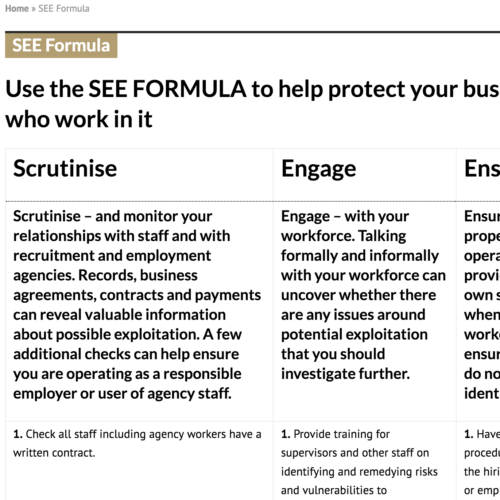 The Staff Wanted Initiative is a collaborative effort from Anti-Slavery International, the UK's only charity dedicated solely to ending modern slavery, and the IHRB, a leading international think tank on business and human rights. The Initiative works to raise awareness and end exploitation of workers in UK hotels. The SEE formula is a three-fold approach to protecting business from labour rights violations - "Scrutinise, Engage, Ensure". It emphasises the need to monitor relationships between and with employees, to communicate informally and formally with workforce, and to provide staff with clear operational procedures when dealing with agency workers.
The Staff Wanted Initiative is a collaborative effort from Anti-Slavery International, the UK's only charity dedicated solely to ending modern slavery, and the IHRB, a leading international think tank on business and human rights. The Initiative works to raise awareness and end exploitation of workers in UK hotels. The SEE formula is a three-fold approach to protecting business from labour rights violations - "Scrutinise, Engage, Ensure". It emphasises the need to monitor relationships between and with employees, to communicate informally and formally with workforce, and to provide staff with clear operational procedures when dealing with agency workers.Credit: Staff Wanted Initiative
-
 The Walkfree Foundation was established by Andrew Forrest, the Chairman of Fortescue Metals Group, after he found labour exploitation within his own supply chains and took a number of steps to prevent modern slavery affecting his business. This comprehensive guide considers corporate policy on modern slavery and provides both guidance and tools to implement it. It includes advice on corporate policy and provides template examples of a number of tools. Credit: Walkfree Foundation & Verite
The Walkfree Foundation was established by Andrew Forrest, the Chairman of Fortescue Metals Group, after he found labour exploitation within his own supply chains and took a number of steps to prevent modern slavery affecting his business. This comprehensive guide considers corporate policy on modern slavery and provides both guidance and tools to implement it. It includes advice on corporate policy and provides template examples of a number of tools. Credit: Walkfree Foundation & Verite -
 The Leadership Group for Responsible Recruitment calls for the implementation of the Employer Pays Principle which requires companies to commit to bearing the costs of recruitment. This short guide breaks down six steps companies should take to meet the commitment in practice.
The Leadership Group for Responsible Recruitment calls for the implementation of the Employer Pays Principle which requires companies to commit to bearing the costs of recruitment. This short guide breaks down six steps companies should take to meet the commitment in practice.Credit: Leadership Group for Responsible Recruitment
-
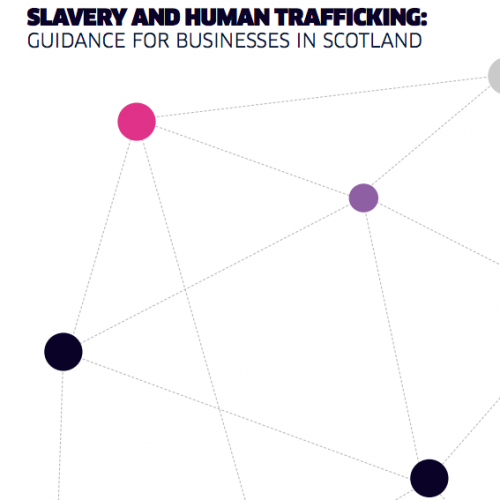 This guide provides tailored advice for all businesses in Scotland in relation to human trafficking, exploitation and every business’s legal and ethical duty. Part one is relevant to all businesses; part two contains advice for businesses with an annual turnover of £36 million or more; part three contains advice for businesses with an annual turnover below £36 million.
This guide provides tailored advice for all businesses in Scotland in relation to human trafficking, exploitation and every business’s legal and ethical duty. Part one is relevant to all businesses; part two contains advice for businesses with an annual turnover of £36 million or more; part three contains advice for businesses with an annual turnover below £36 million.Credit: Scottish Government
-
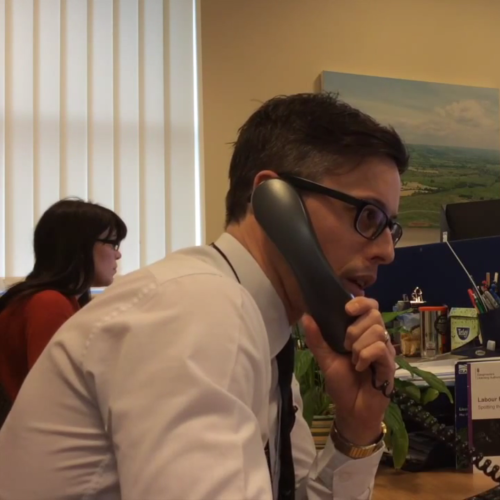 The GLAA (formerly GLA) is a non-departmental public body in the United Kingdom regulating the supply of workers to the agricultural, horticultural and shellfish industries, and any associated processing and packaging industries. It has been granted police-style powers to investigate labour abuse and exploitation across all aspects of the UK labour market. Specific public authorities now have a duty to notify the Secretary of State of any person in England and Wales suspected of being a victim of human trafficking. This ten minute video is an introduction to the indicators that can lead to an arrest for human trafficking. It is a re-creation of a call to the GLAA from a worker and points out the indicators as they emerge during the conversation. Credit: Gangmasters and Labour Abuse Authority
The GLAA (formerly GLA) is a non-departmental public body in the United Kingdom regulating the supply of workers to the agricultural, horticultural and shellfish industries, and any associated processing and packaging industries. It has been granted police-style powers to investigate labour abuse and exploitation across all aspects of the UK labour market. Specific public authorities now have a duty to notify the Secretary of State of any person in England and Wales suspected of being a victim of human trafficking. This ten minute video is an introduction to the indicators that can lead to an arrest for human trafficking. It is a re-creation of a call to the GLAA from a worker and points out the indicators as they emerge during the conversation. Credit: Gangmasters and Labour Abuse Authority

